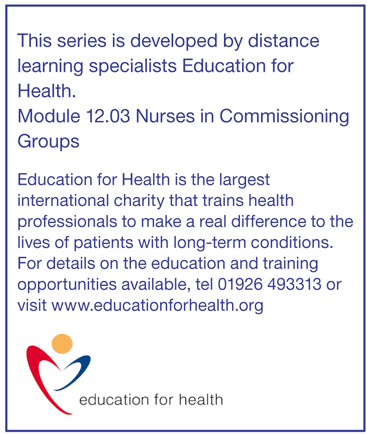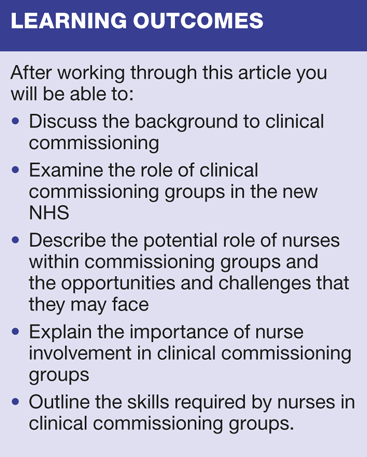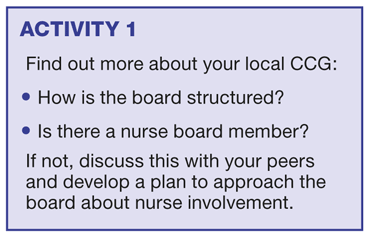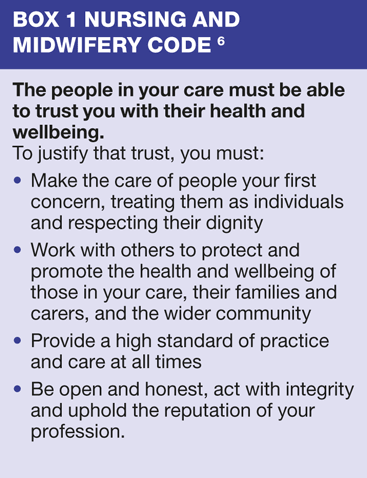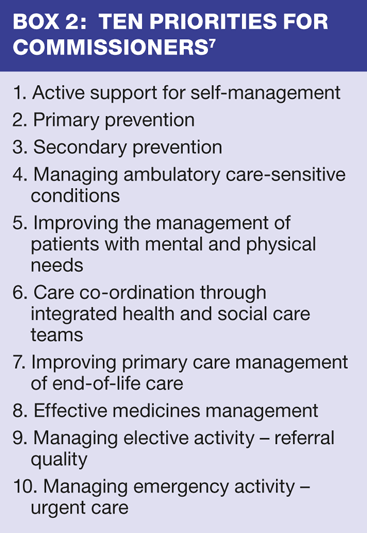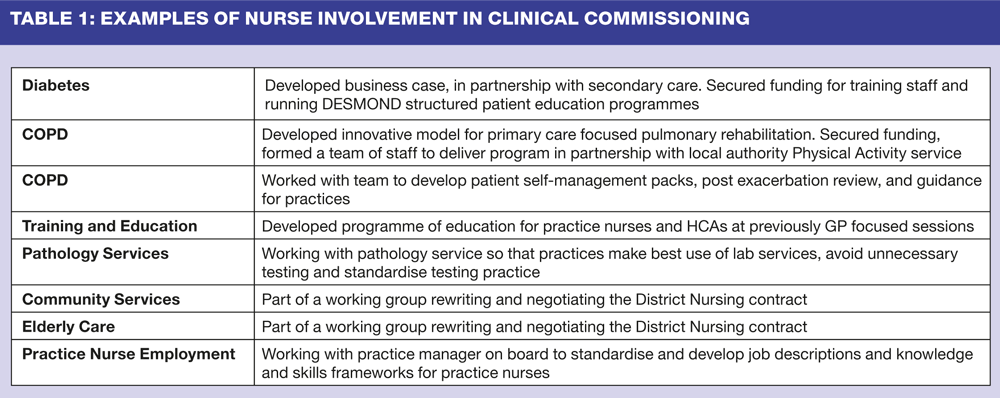Nurses in commissioning groups: exciting challenge or poison chalice?
Deborah Dews
Deborah Dews
BSc (hons), RGN
Nurse practitioner, Birtley, Co Durham &
Beverley Bostock-Cox
MSc, RGN
Nurse practitioner, Sky Blue Medical Group Coventry. Clinical Lead, Education for Health, Warwick
Clinical commissioning is a fact of life. Nurses have a great deal to offer and need to ensure that they have an effective voice in clinical commissioning groups.
Clinical commissioning has been much in the news in recent months - in the medical and nursing press, on television and radio, and in the newspapers. Without doubt its introduction is complex and will be far from easy. Unfortunately, most media reports have been negative and have concentrated on fears around a perceived lack of ability of GPs to manage budgets and maintain or develop good healthcare services for their patients. There are, however just as many good news stories that are unheard and good work unrecognised. Clinical commissioning has the potential to significantly improve health outcomes by improving standards of care and developing new, cost effective services.
The role of nurses in clinical commissioning has also been discussed at great length and the arguments against their involvement have received considerable attention. However, when commissioning was first proposed as a viable means of improving the efficiency of the NHS any talk of 'GP commissioning' referred to general practice, not general practitioners. Nurses make up the biggest professional employee group within the NHS so it could be argued that any suggestion that they should be excluded from the commissioning role would be on a par with denying women the vote or an education.
It is unclear just how many Clinical Commissioning Groups (CCGs) have nurse members and, if they do, what their role is. Anecdotally it would seem that involvement is still at the discretion of the chair of the CCG rather than accepted as the norm. The Government has accepted the NHS Future Forum's recommendation that CCGs should have a nurse on the board, but whilst this is likely to be set out in the regulations it is not in the legislation.1 Concern that the role of nurses on these boards will be 'token' remains. The challenge for nurses in general practice is to be recognised as having an important contribution to make.
BACKGROUND TO COMMISSIONING
The increasing health needs of an aging population and the ability to treat more disease, but at a cost, has made change in the way healthcare is commissioned imperative. The increase in prevalence of chronic disease means that resources need to be directed away from acute, episodic care and towards prevention, management and self-care of long term conditions. This will best be achieved through good clinical practice and integrated working: between different healthcare professionals; between primary and secondary care; and between health and social care.
Since the advent of Practice Based Commissioning (PBC) clinicians have had the opportunity to identify health needs in their locality, and develop new services or reform existing ones to meet that need. It is fair to say that this has achieved varying levels of success and, for many PBC groups progress was painfully slow. The 2010 Government White Paper, 'Equity and Excellence - Liberating the NHS' took commissioning to the next level.2 It set out plans to improve healthcare outcomes by reforming the NHS and coined the phrase 'no decision about me without me' to highlight the importance of shared decision making and patient involvement in service development.
The introduction of GP commissioning consortia, proposed by the draft Health and Social Care Bill,3 means that by 2013 consortia will hold the majority of the NHS budget - more than £60 billion of public money - with the task of delivering a sustainable health care system in a challenging financial and organisational environment. CCGs must go through a process of authorisation to ensure that they are robust and fit for purpose and, initially, the NHS Commissioning Board will support them. From 2013, however, CCGs will be able to commission support from wherever they choose, including the private sector.4
Clinical commissioning aims to improve healthcare outcomes by:
- Reducing variation and inequality for patients within the CCG locality
- Improving mortality and reducing avoidable admissions, particularly for those with long term conditions
- Working with local authority and other agencies to improve public health and reform social care.
It also aims to improve efficiency, safety and patient experience. Although there will be budgetary reform there is no new money or bailout for CCGs that overspend. This is either a tall order or a huge opportunity, depending on your outlook!
Seven pillars of GP commissioning have been suggested,5 giving a clear picture of the key areas responsibilities of CCGs. The professional standards pillar includes a commitment to patient centred care, good medical (clinical) practice, respect for colleagues and wise use of resources. The clinical engagement pillar includes engagement with other health professionals and the governance pillar identifies the need for education and training for all health professionals. Surely these things are as relevant to practice nurses as they are to GPs.
WHY NURSES SHOULD BE INVOLVED
GP Commissioning recognises the need for good quality, patient centred, evidence-based, cost effective care. CCGs are required to establish good relationships with all stakeholders, including local authority and patients, to ensure that it meets the needs of the local population. It would seem that the Nursing and Midwifery Council (NMC) Code was written with this in mind.6 (Box 1) One way of fulfilling the NMC Code in our current healthcare system is to get involved in GP commissioning and make sure that all primary care clinicians, not just GPs, have the opportunity to improve health outcomes and services for their patients.
Nurses, despite the difficulties that they may encounter in some areas, are in a unique position to advise within the CCGs: they do not directly benefit financially from any of the systems in place and will always try to remain patient-focused. Sometimes we know that it would be impossible to deliver all that we might want for our patients, but we are often aware of areas where savings could easily be made.
WHAT NURSES CAN GET INVOLVED IN
The King's Fund7 has identified ten priorities for commissioners, (Box 2) which provide focus for their activities and guide commissioning intentions. Several aspects of a practice nurse's daily workload will spring to mind after a quick perusal of this list. Practice nurses have a wealth of experience in many of these areas, particularly points 1-6 and 8. We should be mindful that it is nurses - practice nurses, health visitors, district nurses, community matrons and community psychiatric nurses - who deliver the majority of primary and secondary prevention, and management of long term conditions. Table 1 gives some examples of how nurses have been involved in clinical commissioning within Gateshead CCG.
Time commitment for nurse members of a CCG will depend on the workload, on average one or two sessions a week, 4-8 hours. Whether this is included as part of the nurse's normal work commitment or is undertaken as an 'extra' depends on the CCG and the employing practice. Remuneration again depends on the individual CCG and seems to vary from £36 per hour (the same as a practice manager) to £72 per hour (the same as a GP). As yet there is no standard rate. Generally if CCG work is undertaken in practice time then the practice is reimbursed not the individual.
Nurse board members need to represent the views and concerns of peers as often as possible. The risk of doing so is that they may become involved in so many things that the next skill that they need to learn is the ability to say no! However, if you have a nurse board member on your CCG why not contact him/her and see if you can support any nursing related work. It may be that there are specific work-streams that are relevant and present good opportunities for meaningful involvement. For example, is there a chronic disease area of particular interest, or are you a nurse prescriber? Prescribing practice is a huge area for most CCGs. It is part of evidence-based care and presents potential for improving cost effectiveness and reducing variation in clinical care, yet it seems that nurse prescribers are poorly represented on prescribing groups. Is there an example of best practice that you can share with colleagues and others to improve standards of care? Many practices are doing lots of good work which, if shared, would contribute to raising standards and reducing variation across your area.
PERSONAL EXPERIENCES
One author's exciting challenge
As well as working for 4 days a week in general practice I have experienced the highs and lows of commissioning for the last 4 years, initially as Respiratory Clinical Lead and more recently as an elected CCG board member.
I am fortunate to work in an area that not only recognises and values the input of nurses in commissioning, but actively encourages nurse involvement. I am well aware that this is not the case for many of my colleagues in general practice, but I still feel that it is time for nurses to stand up for themselves and their patients and find ways to get involved. It will necessitate a fair amount of persistence and perseverance and is likely to lead to a lot of work behind the scenes with less remuneration than our GP colleagues - but nothing that is truly worthwhile is ever easy.
The other's 'poison chalice'
Although most GPs are delighted to have the opportunity to hear a nursing voice at CCG meetings, nurses do not receive this welcome universally. I was the nurse representative for several years on both the Primary Care Group (PCG) and the Professional Executive Committee (PEC) and found the experience both challenging and enlightening when it came to seeing how and why decisions about services were made.
For example, I vividly recall a PEC meeting where the decision was made to close all the locality based phlebotomy services as 'we could not afford them'. This was at a time when the Government was encouraging PCTs to bring services into the community, nearer to the patient. The proposal to close the phlebotomy clinics was passed, based on the agreement of the majority of people present and in spite of my vociferous opposition. After a short period of time and a strong challenge from outside the PEC, that decision was reversed.
There were other experiences of a similar nature that left me with the feeling that nurses were just seen as a token presence. Although I lasted longer than my co-nurse PEC members, we all eventually grew disillusioned and stepped down. We felt we had to work twice as hard to be heard and were outnumbered when we tried to speak up. Without being naive, and while recognising that money was, and will remain, an important concern, it often felt as if it was the ONLY concern. Patient-centred care was a theory which we could not afford to put into practice.
We have two CCGs locally; my CCG (let's call it CCG Black) does not have a nurse on the board but the other (CCG White) has had one for some time. Why the disparity? CCG Black has simply not encouraged nurses to get involved (some might say that the attitude has been positively discouraging) and it has continued without a nurse on the board while paying the barest lip service to getting one. Several years ago, one of the key GP leads on CCG Black described himself to me as being a dinosaur when it came to understanding the developing and extending role of the nurse. It appears that not much has changed!
It would seem an obvious thing for an ex-PCG and ex-PEC board nurse to apply for a post on the CCG... surely? Well, no. I have not applied. I feel less and less inclined to put myself into the fray to challenge decisions which will have a negative impact on patient care, when those around me have ideas that are so fixed that they cannot allow them to be challenged.
I would like to salute the nurses, like my co-author, who have taken their place on the CCGs and who will join with GPs and other professionals to do sterling work in ensuring that the patient voice is heard amongst the ker-ching of the cash registers. Furthermore, I fervently hope that my local CCG will soon be boasting the presence of a nurse who is also ready to do battle for the greater good. I fully intend to give that nurse every ounce of support that I can to help him or her tackle the Jurassic Park scenario that could await them. To my great shame, I just don't feel ready to take on the dinosaurs myself. Yet.
CONCLUSION
Since the late 1980s practice nurses have been an integral part of the primary healthcare team and practice nursing has become a recognised career choice. Practice nurses are experienced clinicians, capable of critical thinking and innovation, who strive to deliver good quality, evidence based, cost effective care in an ever changing healthcare landscape. Practice nurses often hear first-hand from patients their experiences of the current healthcare systems, both positive and negative, and this information could provide a valuable contribution to discussions around service development. For many years practice nurses have adapted to change with integrity and dedication for the benefit of patients. It is important that the nursing voice is heard, our input valued and that we remain an integral part of future developments.
CCGs are a fact of life. Criticising decisions once they are made will be pointless. Nurses need to get ready to meet the challenge of the brave new world of the NHS by making sure they are part of the decision-making processes. The NHS has a history of hierarchical structures, but we should not allow subtle bullying, the doctor-nurse game or sexual politics to reduce the potential we have to make a real impact on the NHS of the future.
We should celebrate the opportunities that are now presenting to us and prepare to face them, head on. We should look to our leaders to help us develop the necessary negotiating, leadership and business skills that will allow to us to be fully functioning and contributing members of the CCG. We should show our colleagues on the CCGs that we can and do effectively contribute to their decisions and we should use our influence as CCG board members to show exactly why there should be no question as to the relevance of our position on it.
REFERENCES
1. NHS Allicance, Nurses in Commissioning Network. Involving nurses in commissioning. 2011 http://www.nhsalliance.org/fileadmin/files/pdf/Involving_nurses_in_commissioning_final_3%5B1%5D.pdf
2. Department of Health. Equity and Excellence-Liberating the NHS. March 2011.
3. Department of Health. Health and Social Care Bill (Draft). UK: DOH; January 2011
4. NHS. Developing commissioning support - Towards service excellence (Draft). UK: NHS; October 2011
5. Poole S. The Seven Pillars of GP Commissioning. Pulse. Feb 2011 (cited Nov 2011). Available from www.pulsetoday.co.uk
6. Nursing and Midwifery Council. The code: Standards of conduct, performance and ethics for nurses and midwives. UK: NMC; April 2008
7. Imison C, Naylor C, Goodwin N et al. Transforming our health care system: Ten priorities for commissioners. UK: The Kings Fund; May 2011
Related articles
View all Articles
